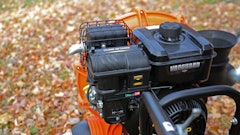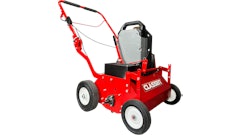
The continued increase in the price of gasoline has greatly impacted the cost of operating outdoor power equipment. Operators are seeking ways to maintain overhead amidst the increasing cost of equipment operation, leading to the noticeable emergence of more efficient engine options provided by manufacturers.
Years ago, the diesel engine option was introduced. The high-density fuel offers elevated levels of efficiency while the engines themselves have proven to be extremely durable. Today, most commercial mower manufacturers offer a diesel zero-turn option.
Additional fuel-efficient options have come onto the outdoor power equipment scene in the form of both Electronic Fuel Injected (EFI) engines and engines that are biodiesel fuel-compatible. Both offer increased efficiency with little or no detrimental effects on engine performance.
ELECTRONIC FUEL INJECTED POWER
In 2007 Exmark began aggressively marketing their Lazer Z EFI. The zero-turn mower features a 28-hp Kohler engine that boasts fuel savings of up to 25 percent. "This past year we have worked with our engine manufacturer to promote the engine and its reliability and efficiency," Allen Meyer, an Exmark product manager, explains. "The kind of savings users see with an EFI engine can equate to $400-500 dollars in just one year."
EFI engines were first introduced to the outdoor power equipment industry in the late 90s. One of the first manufacturers to offer a commercial mower featuring an EFI engine was Walker Mfg. After working with Kohler to implement the system's inclusion on commercial mowers, Walker introduced their first unit using the electronically controlled fuel injection system.
"Electronic fuel injection systems offer several key advantages over carbureted engines, including: fuel efficiency, peak power and torque, startability in all temperatures and optimum throttle response," says Craig Magelan, a senior account executive at Kohler.
One of the most impressive traits of the EFI engine is its efficient operation. The system continuously monitors itself with an oxygen sensor to know for certain that all components are running at levels that ensure optimal operation. By operating at the safest and most favorable levels, the EFI system, along with boosting fuel efficiency, adds the benefit of extending the life of the engine.
"The long life of the engine is one of the most important features with an EFI," Tim Cromley, marketing manager at Walker Mfg., says. "Because the engine is running at an optimal fuel intake, it is running at the best possible temperature. This means that the heads are less likely to warp. Other things that occur when engines are running at higher temperatures are avoided as well."
The long life of the engine doesn't necessarily mean less maintenance, but maintenance is simplified thanks to the ability to connect the engine to a diagnostic machine. "Sometimes with carbureted engines, you don't know whether the problem is air balance or an issue with the fuel," explains Cromley. "With electronic diagnostics, engine maintenance is really improved."
Diagnostic units possessed by dealers can get to the root of the operational issue quickly, perhaps reducing turnover time. As always, extensive training for dealership technicians is provided by the engine or equipment manufacturer, readying techs to perform scheduled and repair maintenance on the EFI engines.
Seasonal engine maintenance is also potentially reduced when using a piece of equipment powered by an EFI engine. "Landscapers, dealers and end consumers who have used EFI-powered equipment understand the maintenance benefits," Rich Koehl, marketing and quality director for Kohler, says. "Once the equipment is stored after a cutting season, the carbureted engine requires replacing parts so that it will resume the next season without any problems. With an EFI engine, there are less maintenance requirements." This allows for an easier transition between the seasons for landscape professionals.
Units with an EFI engine carry a price tag higher than that of carbureted engines, but having been on the market for a few years now, the price has become more affordable. "A couple years ago the retail selling price of an EFI unit could be $1,500 higher," Meyer says. "Today the cost difference between a 28-hp unit that is carbureted and one that is fuel injected is only $500." This cost is nominal when considering the fuel savings that can be made year after year operating the EFI engine.
Prices on the EFI engines will possibly continue to fall further in the near future when the Environmental Protection Agency (EPA) applies stricter emission regulations to outdoor power equipment in 2011. Some mower manufacturers suggest that a push to provide cleaner-running engines will likely cause a significant turn towards EFI engine technology.
"When more manufacturers start offering the EFI option,
the pricing will improve even further," Cromley explains. "It's the economics
of supply and demand. Pricing will come down because everyone is doing it—and they
are doing it in volume. That will make it much more reasonable for us to offer, and the users
to purchase."
BIODIESEL BENEFITS
Sometimes, engine efficiency depends on more than just the engine itself. Creating higher levels of efficiency also means relying on fuel that burns economically. Recognizing the need for more efficient fuel options, The Toro Company sought a way to offer more options to their end-users. After more than five years of extensive testing and research, Toro announced they will be offering biodiesel-compatible engine options in 2008.
The benefits of biodiesel fuel lie in both its energy content and the fuel's clean-burning ingredients. Biodiesel fuel contains energy levels similar to standard diesel fuel which offers 18 percent more energy content than gasoline. The increase in energy content results in less fuel used on the job.
A change in the fuel elements also leads to modified levels of energy output. When using a biodiesel-compatible piece of equipment paired with the biodiesel fuel, operators may experience a decrease in equipment performance. The actual loss in power, amounting to often only 2 percent, is insignificant considering the fuel savings, which can be compared to that of diesel fuel.
Going beyond the benefit of energy efficiency, biodiesel is also good for the environment. According to the National Biodiesel Board, biodiesel is the first and only alternative fuel to complete the health effects testing requirements of the Clean Air Act. The fuel, which is made from renewable resources, is both biodegradable and less toxic than petroleum fuels.
Engines on biodiesel options carry similar components and maintenance requirements as carburetor engines do. The pricing of the engines differs only slightly. "The engines themselves are similar, with the only adaptations required in the fuel delivery system," Toro product manager Ross Hawley says. "There is a very modest cost premium."
In addition to the biodiesel-ready models, Toro has been offering biodiesel conversion kits since late 2007. "The kits are designed to be used with the engines and fuel systems utilized on Toro products," Hawley explains. "They have not been tested to ensure compatibility with any other manufacturer's engine and fuel system."
Toro has seen a great increase in the attention paid to the biodiesel options by both consumers and fellow manufacturers. "We've seen an increase in popularity, especially with people who are existing diesel fuel users," says Hawley. "Farmers, municipalities and owners of large diesel-powered equipment fleets are switching to biodiesel blends for the lower emissions and the reduction of dependence on foreign oil." A list of registered biodiesel fuel suppliers and additional information on the fuel is available at biodiesel.org.
Already an active manufacturer of EFI engines, Kohler is now beginning to offer biodiesel options as well. In November 2007, John Deere also took a stance on the use of the renewable fuel source. They made clear that fuel blends with a concentration of up to 20 percent biodiesel can be safely used in all John Deere engines through Tier 3/Stage III A models, but that a B5 blend is favored. This ruling also includes engines that are non-emissions certified.
The price of gasoline continues to escalate daily, bearing negative effects on the cost of operating outdoor power equipment. The additional options offered by manufacturers to end-users may aid in combating these high operating costs. The increasing presence of more efficient engine and fuel options can help to extend the life of the engine as well as the fuel.
As environmental regulations on emissions continue to surface, manufacturers will likely feel the pressure to provide cleaner-running engines. This in turn will provide even more options for the level of mower engine efficiency desired.















